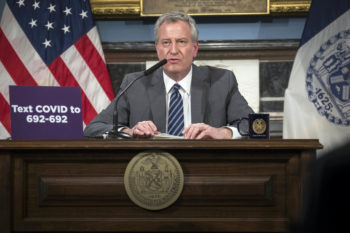
Mayor Bill de Blasio holds media availability for updates to the City’s coronavirus. Image Credit: Ed Reed/Mayoral Photography Office
Questions about transient use and multiple dwelling law linger after City and Airbnb’s settlement. On June 12, 2020, Mayor Bill de Blasio and Airbnb announced a settlement of their lawsuit regarding Local Law 146 of 2018. Local Law 146 of 2018 requires users of short-term rental platforms, like Airbnb, to file reports with the City detailing individual host and transaction information. In their initial filings, Airbnb and the other associated parties expressed concern about data storage, sharing and privacy, claiming the local law violated the First and Fourth Amendments of the United States Constitution, the Stored Communications Act and the New York State Constitution. Airbnb was awarded a preliminary injunction for their claims on January 3, 2019. This newly announced settlement between involves Airbnb dismissing the lawsuit against the City and agreeing to provide the City the specified host and transaction information, in the manner described by the settlement’s prospective local law. It is important to note that the settlement is premised on the actual adoption of the new law governing short-term rental reporting. The City Council Committee on Housing and Buildings held a public hearing on the proposed bill amendments on June 17, 2020. The Mayor’s Office of Special Enforcement testified but there were no questions or comments.
The law local proposed in the settlement would require quarterly reporting for a qualified group of short-term rental users, instead of monthly reporting for all users. Reports would be required for listings that generate five or more nights of bookings per quarter, and offers the entire home or permits three or more guests at a time. Reports will not be required for listings of private or shared rooms, for two or fewer guests, for less than five nights per quarter, or listings that qualify as traditional hospitality locations. The reports themselves will include the physical address of the listing, host information, the number of days booked, the amount received by the host and the listing’s name, number and URL.
Noticeably, the settlement does not reference the State’s Multiple Dwelling Law’s prohibition on “un-hosted” rentals, of less than thirty-days, in “Class A” buildings. Class A buildings are essentially those buildings occupied by three or more families as permanent residences. The Mayor’s Office of Special Enforcement may impose fine of up to $2,500 per day for building and unit owners found in violation of the law. The transparency resulting from the settlement is intended to prevent corporate entities and “superhosts” from skirting state, local and hotel taxes, and should effectively put more housing on the market by making the illegal thirty-day rentals more easily identifiable.
Commentary
For Airbnb, the settlement appears to be a measure to establish trust with the City and State officials and legislators. Airbnb co-Founder Nate Bleacharczyk, stated, “we hope that our willingness to be transparent enables the State and the City to feel reassured that short term rentals can be effectively regulated without blunt prohibitions. Now more than ever, regular New Yorkers should have the ability to occasionally share their home, activity that we believe should not be confused with illegal hotels.”
Mayor Bill de Blasio stated, “Illegal hotel operators who flout the law at the expense of working New Yorkers have no place in our neighborhoods,” adding, “finally, we’ll have the critical information we need to preserve affordable housing and keep our communities protected.
CityLand reached out to Cohen, Hochman and Allen, a law firm who regularly handles administrative and transient use cases, for comment on the settlement. Bradley Green, a partner at the firm, said, “the recent settlement creates a better balance between the competing interest of the city and web platforms. The increased transparency of the web platforms can be used as a tool for enforcement for the City. However, there should be less interference by the City for those users utilizing the platform for legal purposes.”
Christopher Lehane, Senior Vice President for Global Public Policy and Communications for Airbnb said, “We have long wanted to work with New York City on an effective regulatory framework, including information sharing- – this agreement achieves that…As we look toward the recovery of New York’s tourism economy, we hope this settlement will represent a continuing relationship and the first step on a path forward for our community citywide.”
The law is not expected to take effect until 2021. To read more Cityland coverage of Airbnb and rental platforms in New York City click here.
By: Jason Rogovich (Jason Rogovich is the CityLaw Fellow and New York Law School Graduate, Class of 2019)


Thanks for sharing this informative article. Please keep sharing.